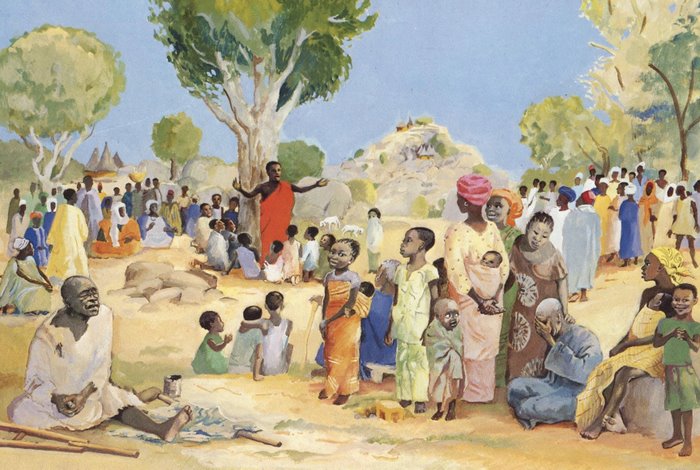ICCH Bulletin of January 29, 2023
January 29, 2023 Fourth Sunday in Ordinary Time
Welcome Father Eckhard Today’s Readings: Zep 2:3; 3:12-13 | 1 Cor 1:26-31 | Mt 5:1-12a

When we, as priests, meet with a family who have lost a loved one to choose the readings for the Funeral Mass, sometimes the family will choose today’s gospel reading. What is it that draws people to this gospel reading as they plan the Funeral Mass of a loved one? I suspect there may be two reasons. The first reason is that they recognize something of their loved one in the first part of each beatitude, which portrays a certain set of attitudes or ways of behaving. The second reason relates to the second part of each beatitude which contains a promise of what God will grant in the kingdom of heaven.
The beatitudes have spoken powerfully to followers of Jesus at every stage of their life’s journey, not just when coming to terms with the death of a loved one. There is something attractive, even if demanding, about the set of attitudes and actions that make up the first part of the nine beatitudes. It is as if Jesus is giving us a portrait of what his disciples look like. In some sense, Jesus is giving us his own self-portrait. He is the one who lives the beatitudes to the full. He gives complete expression to the attitudes, values and actions that are portrayed there. Yet, according to the gospel reading, he spoke these beatitudes to his disciples, and, as risen Lord, he continues to speak them to us today. He is saying to us, ‘this is the kind of life that will flow from allowing yourselves to be embraced by the God of infinite love, whom I reveal and make present’. If we open ourselves to the Lord’s daily coming and to his daily sending of the Holy Spirit into our lives, this is the kind of person we will become.
We will be poor in spirit, in the sense that we will acknowledge our deep need of God, the Father of Jesus and our Father. In our need we will come before God with empty hands, recognizing that apart from God we can do nothing worthwhile, but with God everything is possible. We will be gentle, in that we will allow God to be God in our lives, constantly seeking what God wants rather than arrogantly insisting on what I want. There is nothing weak about this kind of gentleness. It comes from an inner strength, the fruit of our reliance on God. We will mourn because the world, the church, our own lives, are not yet all God desires them to be. We are sensitive to the ways that the kingdom of God has not yet come into our world and we are disturbed by all that is not of God in our world. This was the mourning of Jesus, when he wept over Jerusalem because the people there, especially its leaders, had not recognized him as the one through whom God was visiting them.
Our mourning over what is not of God in our world will not leave us passive or despondent. Rather, it will deepen our hunger and thirst for what is right, for justice for those all deprived of it, for the coming of God’s kingdom. As a result, we will be merciful, giving expression to the Lord’s merciful and compassionate love for all. It is striking the number of people who come up to Jesus in the gospels with the plea, ‘have mercy on me’ – the lame, the blind, the lepers, sinners, the broken in body and in spirit. The most powerful display of merciful love in the gospels is the Samaritan in one of Jesus’ more memorable parables. We will also be pure in heart. What is being referred to there is a purity of intention. Whatever good we do is done to promote God’s cause, God’s purpose, not our own. We are not giving with a view to getting for ourselves. John the Baptist displayed this quality when he said, ‘He (Jesus) must increase, I must decrease’. We will be peacemakers, not just peace lovers, but people who work with others to bring about the peace, the fullness of life, that God intends for all, whether that is in our own family, in our community or in our world. Lastly – and this is perhaps the most difficult beatitude of all – we will be ready to live out of these values and attitudes, even if that means suffering and loss for us. We will be faithful to this life the Spirit prompts us to live, even though it means losing out, as many would see it.
These are the attitudes, values, the way of life, that will flow from opening of our hearts to the Lord’s loving presence. This way of life is what Saint Paul refers to in one of his letters as the fruit of the Spirit, the rich fruit of the Spirit of the Lord’s love poured into our hearts. Certain fruits take longer to ripen that others. We will never give full expression to this vision for life that Jesus puts before us in the beatitudes. All we can hope is that we are growing towards it. It is the path of life. If we are faithful to it, all the promises made by Jesus in the second part of the beatitudes will come to pass for us.
Source: Fr. Martin Hogan, https://at.tumblr.com/frmartinshomiliesandreflections/29th-january-fr-martins-gospel-reflections/w4d9lk1mvtaq Image: JESUS MAFA. The Sermon on the Mount, from Art in the Christian Tradition, a project of the Vanderbilt Divinity Library, Nashville, TN. https://diglib.library.vanderbilt.edu/act-imagelink.pl?RC=48284 [retrieved January 28, 2023]. Original source: http://www.librairie-emmanuel.fr (contact page: https://www.librairie-emmanuel.fr/contact).
